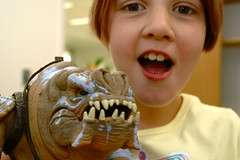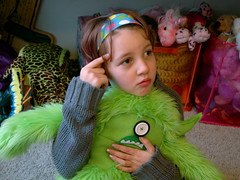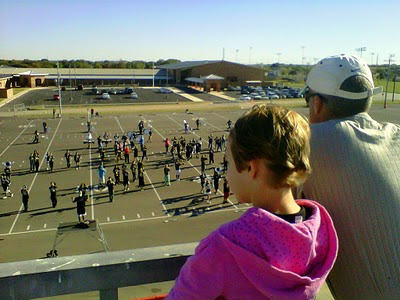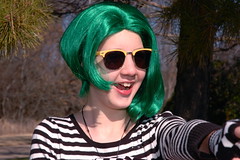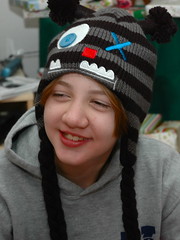---
"I personally disagree with your use of the term "monster" to describe something that your child cannot separate from herself. This goes against every instinct I have. I am an educator but not a parent.
"I don't think most people (with the always exceptional minority of crazies) would argue this point with you out of spite or with the goal of proving you wrong but rather out of concern for your daughter and a hope that sharing one's own experience can make a difference in the life of another child and family going through a familiar struggle.
"However, there is no point arguing about it as only time will tell how your daughter will feel about it. I do feel it is important to hear the experiences and opinions of adults who have grown up with disabilities or differences (whatever they may be). I think theirs is the most relevant voice in this debate."
Of course you are entitled to your opinion and your disagreement, and I thank you for posting. A few thoughts:
You're absolutely right, there is no predicting how Schuyler will feel about anything I've written about her and her condition. That point has been made in countless "How is she going to feel one day when she reads...?" posts and emails and criticisms. It's a valid point. You have to remember, however, that our feelings and opinions and reactions to Schuyler's situation aren't happening in a vacuum. I'm not writing one thing and saying another to her. From the very beginning, she has been raised to understand that no, she's not like other kids and yes, she has to work hard to overcome the obstacles that are in her way.
Schuyler knows that there's something wrong with her brain, she understands better than you or me or anyone else how true that is. She may choose to see it differently as she gets older, but she'll make that determination on her own. And she'll do so knowing that her parents love her and are inspired by her. The idea that she will one day read something I wrote and suddenly she'll know some dark secret about how I visualized her disorder is absurd. She already knows what the title of the book refers to; it was her metaphor originally, after all. We don't keep anything from her regarding her condition. THAT would be offensive, wildly so. Schuyler's not a delicate flower. She's a tough kid, because she has to be, and she's also a realistic one.
People acting out of concern for Schuyler are certainly within their rights to do so. Concern that she will be somehow wounded by an acknowledgement of her very real, very hard condition is frankly insulting to her, though. It sells her short. It denies her very real ability to face her condition head on.
"I do feel it is important to hear the experiences and opinions of adults who have grown up with disabilities or differences (whatever they may be). I think theirs is the most relevant voice in this debate."
Their voices are both absolutely relevant, and at the same time completely beside the point. I hope you don't think that after all this time, I haven't been listening to the opinions of persons with disabilities, along with their families and caregivers. But the thing you might not understand is that if I've heard from a hundred people, I've heard about a hundred different opinions and perspectives. There is no consensus. Well, of course there isn't.
For every person who is inspired by the Holland poem, there are equal numbers who find it to be condescending and ridiculous. For every person who depends on their faith in God to sustain them, there's an equal number who feel like that God has turned his back on their loved ones, or who have lost their faith altogether. For every person with a disability who finds comfort in People First Language, there are equal numbers who self-identify with terms like "cripple". Which of these voices should dictate how my family and I deal with Schuyler's disability?
"I personally disagree with your use of the term "monster" to describe something that your child cannot separate from herself. This goes against every instinct I have. I am an educator but not a parent."
I think this is an important point. I respect that my philosophy goes against your instincts. I am going to have to insist, however, that you likewise respect the fact that those educator's instincts are very different from those of a parent, particularly if you don't have children of your own. And I don't mean to condescend, either. But no matter how dedicated of an educator you may be, no matter how much time and energy and personal emotional investment you put into your work with our kids, there is a very real difference between our worlds.
You get to go home at the end of the day. You get to watch our kids grow older and leave your care. No matter how challenging or how impressive our kids' disabilities may seem to you, the fact remains that we live with them in ways that you simply don't. From the moment our kids' disabilities revealed themselves to us, entirely unanticipated, we live with the reality of those disabilities every minute of every day, and not for a year, or a few years, but for the rest of our lives. We don't just worry about whether our kids are going to successfully complete the school year. If our kids survive their hard childhoods, we then get to wonder who is going to take care of them when we die.
I hope you'll understand how something that is a part of our beloved, beautiful child can still be monstrous, for her and for me. In the end, Schuyler will come to her own conclusions about that word and about her condition. But she won't be surprised, and I seriously doubt she'll be offended. I don't give Schuyler sugar-coating or soft language. I will always give her love, and the truth. Those may actually be the two most valuable things that I have for her.
